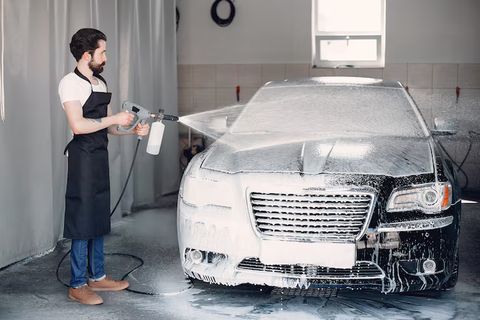Learn & Gain Knowledge: Resources to Help You Master Car Care
Car care refers to the practice of maintaining, cleaning, and repairing vehicles to ensure they run efficiently, safely, and for as long as possible. From oil changes and tire rotations to brake inspections and battery checks, proper care helps extend the life of a car and reduces unexpected breakdowns.
The topic exists because cars are complex machines that require regular attention. Unlike decades ago, when most maintenance was mechanical and relatively simple, today’s cars rely on advanced electronics, sensors, and digital systems. This means that vehicle owners need access to updated knowledge, reliable tools, and trusted resources to handle basic maintenance and know when to seek professional help.

Importance
Car care is more relevant today than ever for several reasons:
-
Safety: Regular inspections of brakes, tires, and lights help prevent accidents.
-
Cost savings: Preventive maintenance reduces the likelihood of expensive repairs. For example, changing oil on time prevents costly engine damage.
-
Vehicle lifespan: Proper upkeep can add years to a car’s usability.
-
Fuel efficiency: A well-maintained car uses less fuel, lowering costs and emissions.
-
Resale value: Cars with documented maintenance histories often sell at higher prices.
Who does it affect?
-
Drivers and car owners: Understanding maintenance helps avoid being overcharged or misinformed.
-
Families: Dependable vehicles reduce the risk of being stranded.
-
Communities: Proper car care leads to safer roads and reduced pollution.
Recent Updates
The last year (2024–2025) has brought new developments in car care that vehicle owners should be aware of:
-
Electric Vehicle (EV) Maintenance (2024): EV adoption increased globally, with many countries reporting double-digit growth. EVs require less frequent maintenance than gasoline cars but need specialized checks for batteries and charging systems.
-
Digital Car Manuals (2024): Automakers are shifting from printed manuals to mobile apps and QR code-based guides, making information easier to access.
-
Connected car diagnostics (2025): More vehicles now feature built-in diagnostic systems that alert drivers directly on their smartphones about service needs.
-
Sustainability focus: Eco-friendly car care products, such as biodegradable cleaners and low-impact motor oils, are gaining popularity.
-
Regulatory changes (2024): Several countries updated emissions inspection programs, requiring more frequent testing in urban areas to combat pollution.
Graph: Key Trends in Car Care (2024–2025)
| Trend | Impact on Owners |
|---|---|
| EV growth | New maintenance needs for batteries |
| Digital manuals | Easier access to instructions |
| Smartphone diagnostics | Faster awareness of issues |
| Eco-friendly car products | Safer for environment and users |
| Emission testing updates | Stricter compliance requirements |
Laws or Policies
Car care is influenced by regulations that vary by region but share common goals: safety, environmental protection, and consumer rights.
| Region | Policy/Regulation | Effect on Car Care |
|---|---|---|
| United States | Clean Air Act & state emissions programs | Requires regular emissions checks, affecting repair and maintenance schedules. |
| European Union | EU Roadworthiness Package (updated 2023) | Mandates safety inspections and stricter emission standards. |
| India | Bharat Stage VI (BS6) emission norms | Higher maintenance standards for fuel systems to meet air quality goals. |
| Japan | Shaken vehicle inspection system | Requires periodic inspections to ensure safety and performance. |
| Global | Right to Repair movement (varies by country) | Expands access to repair information, giving car owners more control over maintenance. |
Government initiatives also encourage driver education. For example, in 2024, several U.S. states expanded public awareness campaigns about EV maintenance, while the EU introduced stricter requirements for tire and brake inspections to improve road safety.
Tools and Resources
Car care is easier today thanks to a variety of tools, apps, and online resources.
-
Apps & Digital Tools
-
Carfax Car Care (U.S.): Tracks service schedules and recalls.
-
myCARFAX and Drivvo: Help log maintenance and fuel use.
-
Automaker apps (e.g., FordPass, Toyota App): Provide remote diagnostics and reminders.
-
-
Websites & Learning Resources
-
YouTube educational channels: Step-by-step tutorials for common maintenance.
-
Automotive forums: Communities like Reddit’s r/cars or CarTalk offer peer advice.
-
Manufacturer websites: Provide downloadable manuals and service schedules.
-
-
DIY Tools for Home Care
-
Tire pressure gauge and portable inflator.
-
OBD-II scanner (connects to smartphones for diagnostics).
-
Basic toolkit: wrenches, screwdrivers, and safety gloves.
-
-
Professional Resources
-
ASE (Automotive Service Excellence): Provides guides and certifications.
-
National Highway Traffic Safety Administration (NHTSA): Offers recall checks and safety updates.
-
Table: Car Care Resources at a Glance
| Category | Tool/Resource | Use Case |
|---|---|---|
| Mobile App | Carfax Car Care | Tracks services & recalls |
| DIY Device | OBD-II Scanner | Diagnoses check-engine light |
| Website | NHTSA.gov | Safety and recall checks |
| Manual Resource | Automaker apps | Maintenance schedules |
| Learning Platform | YouTube & ASE guides | Tutorials and professional knowledge |
FAQs
Q1. How often should I service my car?
Most cars need service every 6 months or 5,000–7,500 miles, but it depends on the manufacturer’s recommendations. EVs may need fewer visits but require battery checks.
Q2. Can I do car maintenance myself?
Yes, many tasks—like oil changes, air filter replacement, and tire pressure checks—can be done at home with basic tools. However, advanced repairs should be handled by certified mechanics.
Q3. How do I know if my car needs immediate attention?
Warning lights on the dashboard, strange noises, leaks, or difficulty starting are all signs. Modern cars also send diagnostic alerts via smartphone apps.
Q4. Are electric cars easier to maintain?
Generally, yes. EVs have fewer moving parts, no oil changes, and less wear on brakes due to regenerative braking. Still, batteries, tires, and cooling systems require attention.
Q5. What are the biggest mistakes people make in car care?
Delaying regular oil changes, ignoring tire pressure, skipping brake inspections, and overlooking recalls are common errors that can lead to higher costs and safety issues.
Conclusion
Mastering car care is not just for mechanics—it’s a practical skill that benefits every driver. By understanding the basics, using modern apps and tools, and keeping up with regulations, car owners can extend their vehicles’ lifespans, save money, and ensure safety on the road.
Recent advances such as EV-focused maintenance, digital manuals, and diagnostic apps make it easier than ever to stay informed. Coupled with reliable resources like manufacturer guides, government safety websites, and DIY tools, anyone can take control of their vehicle’s upkeep.
Ultimately, good car care is about responsibility—towards your own safety, your passengers, and the wider community. By investing time in learning and applying simple practices, drivers gain both knowledge and confidence, ensuring that their vehicles remain reliable companions for years to come.





